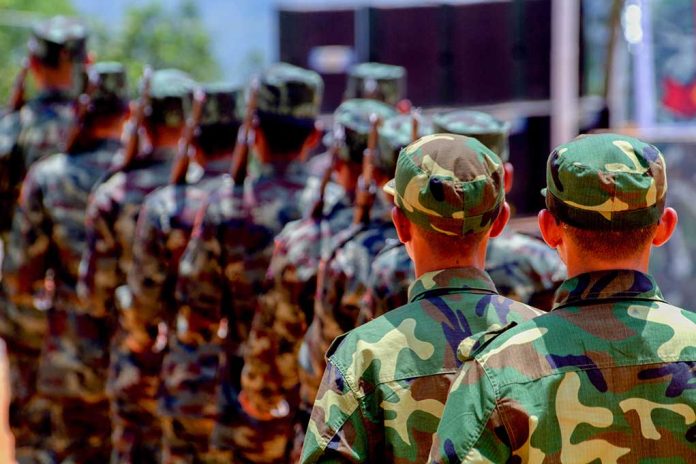
Prime Minister Modi’s bold declaration that India has merely “paused” military action against Pakistan signals a dramatic shift in India’s defense posture, asserting dominance in a conflict that nearly spiraled into nuclear war.
Key Takeaways
- India has only temporarily halted military operations against Pakistan following Operation Sindoor, with Modi emphasizing that action has been “paused,” not ended
- The conflict escalated after terrorists killed 26 civilians in Pahalgam, prompting India to strike terrorist bases in Bahawalpur and Muridke
- Modi claims over 100 terrorists were eliminated and Pakistan’s terror infrastructure was significantly damaged, leading Pakistan to request de-escalation
- President Trump and his administration helped broker a ceasefire, preventing what Trump described as a potential “bad nuclear war.”
- Diplomatic tensions continue with India expelling a Pakistani diplomat and both nations implementing trade and travel restrictions
Modi’s Strategic Pause, Not Surrender
In a defining moment for India’s military doctrine, Prime Minister Narendra Modi has declared that India has only “paused” its military action against Pakistan, asserting the nation would “retaliate on its own terms” to any future provocations. This statement comes after recent ceasefire agreements temporarily halted what had become the most severe conflict between the nuclear-armed neighbors in nearly three decades. Modi’s calculated language reflects India’s increasingly assertive stance toward cross-border terrorism and marks a significant departure from previous approaches of diplomatic restraint.
The recent hostilities were triggered by a heinous attack in Pahalgam, Jammu and Kashmir, which resulted in 26 civilian deaths, predominantly tourists who were reportedly targeted based on their religion. India’s response, codenamed Operation Sindoor, included precision strikes on terrorist bases in Pakistan’s Bahawalpur and Muridke regions. Modi proudly announced that these operations eliminated “over 100 terrorists” and significantly damaged Pakistan’s terror infrastructure, a claim that demonstrates India’s growing confidence in its military capabilities against its western neighbor.
Addressing the nation, Modi asserted that India’s armed forces inflicted such “heavy damage” on Pakistan that Islamabad was compelled to plead for global intervention to de-escalate the conflict. If that was indeed the case, why then did Modi agree to an immediate ceasefire,…
— Brahma Chellaney (@Chellaney) May 13, 2025
Trump Administration’s Critical Intervention
While Modi has carefully avoided acknowledging external influence in the ceasefire decision, President Donald Trump prominently announced his administration’s role in preventing a potentially catastrophic escalation. “I think it could have been a bad nuclear war; millions of people could have been killed. So I’m very proud of that,” stated Donald Trump. Secretary of State Marco Rubio and Vice President JD Vance were credited with the diplomatic breakthrough that pulled both nations back from the brink of disaster, demonstrating the Trump administration’s effective approach to international crisis management.
“Narendra Modi has said India has only “paused” its military action against Pakistan and would “retaliate on its own terms” to any attacks, after a ceasefire brought escalating hostilities between the two countries to a standstill at the weekend,” said Narendra Modi, Prime Minister of India.
Contrary to the Trump administration’s narrative, Modi emphasized that Pakistan initiated the ceasefire request after sustaining significant damage. According to Pakistani sources, the conflict resulted in 11 armed forces and 40 civilian casualties. The differing narratives highlight the complex diplomatic dance taking place, with Modi bolstering his image domestically as a strong leader who forced Pakistan to back down. At the same time, the Trump administration has demonstrated its effectiveness in foreign policy on the global stage.
Escalating Diplomatic Tensions Amid Military Pause
Despite the military ceasefire, diplomatic tensions continue to simmer. India recently expelled a Pakistani diplomat for allegedly “indulging in activities not in keeping with his official status,” a thinly veiled accusation of espionage. Both nations have implemented punitive measures, with India suspending visa services, halting trade, and threatening to reconsider the Indus Waters Treaty. Pakistan has reciprocated by banning visas for Indians, closing its airspace to Indian aircraft, and imposing its own trade embargo.
“if we talk to Pakistan, it will be about terrorism only … it will be about Pakistan-occupied Kashmir,” said Narendra Modi, Prime Minister of India.
Modi has set clear parameters for any future dialogue with Pakistan, stating that discussions would focus exclusively on terrorism and Pakistan-occupied Kashmir. This hardline stance signals India’s unwillingness to engage in comprehensive peace talks without addressing these fundamental issues. Both nations have agreed to reduce troop presence along the Line of Control, where skirmishes continue despite the broader ceasefire agreement. In Indian-administered Kashmir, efforts to defuse unexploded ordnance are underway as evacuated residents cautiously return to their homes.
PM @narendramodi says
🚨 All our 3 Forces and BSF are in a state of constant vigil
🚨 #OperationSindoor is now India’s foreign policy towards Pakistan. It is the “new Normal” in India’s policy
🚨 India will not stand for any nuclear blackmail
🚨 The presence of Pakistani… pic.twitter.com/RnEk3ilacF
— CNBC-TV18 (@CNBCTV18News) May 12, 2025
Self-Reliance in Defense: Modi’s Strategic Vision
A key aspect of Modi’s address was his emphasis on India’s growing self-reliance in defense capabilities. He proudly highlighted the effectiveness of domestically developed weapons systems deployed during Operation Sindoor, reinforcing his government’s “Make in India” initiative in the defense sector. This focus on indigenous defense production represents a strategic shift aimed at reducing India’s traditional dependence on foreign military suppliers while building a more independent security posture that can respond effectively to regional threats.
The current pause in hostilities has allowed for temporary stabilization, with India reopening 32 airports that had been closed during the height of tensions. However, Modi’s characterization of the ceasefire as merely a “pause” rather than a conclusion sends a clear message both domestically and internationally: India under his leadership will no longer tolerate cross-border terrorism and stands ready to resume military operations if provoked. This assertive posture represents a significant evolution in India’s security doctrine that will likely shape regional dynamics for years to come.




